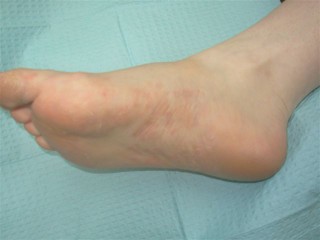
Allergic ReactionĪn allergic reaction on the skin, also known as dermatitis, can cause itchy feet. The signs scabies is the cause of itchy feet are thick, crusty, dry sores on the feet. While they may get into your feet, they can move all over your body and end up in your hands. These are microscopic mites that burrow themselves into your skin. Scabies is like bugs, but deserve their own section. This condition will run its course, but there are some anti-itching creams you may want to get to help you get through the healing process. The best way to relieve this cause of itchy feet is to apply a cold compress to the area. In addition to the itching, you may experience swelling and redness. There is nothing worse than having a mosquito or other bug bite you on the feet, especially in several places. If you use it and it doesn’t work, contact a podiatrist for something stronger. There are many creams over-the-counter at your local drug store, but they aren’t always effective. Unfortunately, this fungal infection will not run its course and go away on its own.
#Arches of feet itch skin
Dry feet can lead to painful cracks in the skin and flaky scales. A thick everyday foot moisturizer - applied after a shower - helps a great deal. Dry Skin: In some cases, dry skin is hereditary or a side effect of a medication or other medical condition. As a general rule, we recommend heavy moisturizers, but we can also treat diabetes-related itching with medication for fungal infections and assist the patient in getting - and keeping - their blood sugars under control.ĥ. Circulation issues, also caused by diabetes, places patients at risk for foot fungus infections and open sores. Diabetes: The high blood sugar that is present in people with diabetes is linked to dry, itchy skin, especially on the feet. Allergic dermatitis can be remedied by avoiding the root cause and using over-the-counter anti-itch creams.Ĥ. The itching may also be accompanied by heat, swelling, redness, and cracks in the skin. A common cause is a dye that is found in dark socks, and wherever the sock touches the foot will typically itch if that’s the cause. It can take anywhere from 12 to 21 days from first contact to experiencing symptoms, so it’s often missed.

This is why a portion of the population is extremely susceptible to allergic dermatitis.


Dermatitis: Your feet are in contact with all sorts of irritants in cosmetics, soaps, or plants, for instance. A cold compress will also reduce inflammation and provide some relief.ģ. A topical antihistamine such as Benadryl can help decrease histamine levels in the body. Bugs: Bug bites activate the release of histamine, which causes inflammation and itching. It won’t go away on its own, and if OTC topical creams don’t stop the itching, contact a podiatrist who can prescribe something stronger.Ģ. Symptoms may include a flaking red rash between the toes that advances to blisters and peeling. Athlete’s Foot: Athlete’s foot is a fungal infection, typically contracted while walking barefoot in public pools, locker rooms, or hotel showers. Travis Holloway of Amarillo Foot Specialists are sharing five of the most common causes for itchy feet.ġ. If your feet are always itching, you may wonder what may be causing it and whether or not it’s a serious concern.


 0 kommentar(er)
0 kommentar(er)
